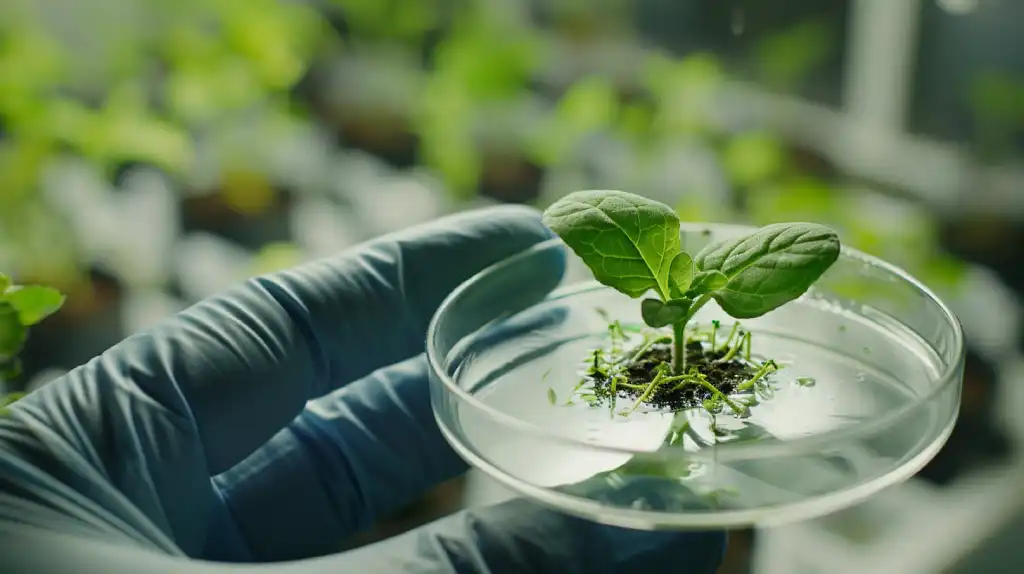Resistance to biotechnology commonly originates from concerns about its potential impacts.
These include ethical challenges surrounding genetic modification, fears of unexpected consequences, environmental risks, economic imbalances, and public distrust in scientific inventions. Also, religious or cultural beliefs can add to opposition.
Resistance to biotechnology also occurs from concerns over potential economic gaps, where benefits may primarily gather to developed nations, worsening global imbalance.
Biotechnology and Agriculture
Biotechnology involves using living organisms to develop new products and technologies. It’s important because it has the potential to solve many global challenges, such as improving food security and healthcare.
Genetically modified crops can yield 22% more than traditional crops, and biotech improvements have led to a 21% decrease in pesticide use.
Why there might be some resistance to the use of biotechnology
Resistance to biotechnology comes from concerns about safety, ethics, environmental impact, economic control, and lack of clear regulations. These issues prevent public acceptance and adoption of this technology.
Facing these concerns through open dialogue, rigorous research, and effective regulation is important for gaining public trust and realizing the full potential of biotechnology.
Challenges in the Acceptance of Biotechnology

Resistance to biotechnology appears from concerns about its safety, ethical effects, and socioeconomic effects.
Biotechnology offers a wide range of potential benefits, but it also raises some important concerns. Here’s a closer look at some of the reasons why people might be concerned about its use:
Health Concerns
- Unforeseen outcomes: Some fear that genetically modified foods might have unexpected health effects. There is concern over the long-term safety of consuming such products.
Environmental Impact
- Environmental Damage: People fear that biotechnology, especially genetically modified organisms (GMOs), might harm ecosystems.
- Biodiversity Loss: Reliance on a few genetically engineered crops could reduce biodiversity and make agricultural systems more vulnerable to pests and diseases.
Ethical Concerns
- Ethical Issues: There are moral concerns about altering the genetic makeup of living organisms. Some believe that genetic modification crosses ethical boundaries and interferes with natural processes.
Cultural Concerns
- Cultural and Societal Views: Different cultures and societies have different views on biotechnology. In some places, there is a cultural dislike to genetically modified foods or disbelief about new technologies.
Economic Concerns
- Economic Effects: There are concerns about the control of biotechnology by large corporations. People worry that this could lead to increased economic imbalance and trusts in the food and agriculture sectors.
Regulatory Concerns
- Regulatory and Legal Challenges: The regulation of biotechnology can be complicated. There are discussions about how strict safety assessments should be and the role of government in managing biotechnological progress.
Reducing Resistance to the Use of Biotechnology
To tackle these concerns, it’s important to have clear communication about the safety and benefits of biotechnology.
Regulations should be clear and enforced to protect public health and the environment. Public engagement and education can also help build trust and knowledge.
To face these concerns and gain public trust, we need:
- Open dialogue: Transparent communication about the research and its potential risks and benefits is crucial.
- Efficient scientific research: Thorough and independent research is essential to secure the safety of biotechnology.
- Clear and effective regulation: Establishing clear and up-to-date regulations is necessary to assure responsible development and use of biotechnology.
Showing people how biotechnology can help us, like by making better medicines or growing more food, can make them less worried about it.
The Bottom Line
Biotechnology offers both benefits and risks. While it offers potential benefits like increased crop yields, improved nutrition, and reduced environmental impact, it also raises valid concerns.
People worry about its safety, ethical implications, environmental consequences, and corporate control.
To fully know the benefits of biotechnology, it’s essential to address these concerns through open dialogue, rigorous research, and effective regulation.
Handling these issues is crucial for the responsible development and acceptance of biotechnological innovations.




